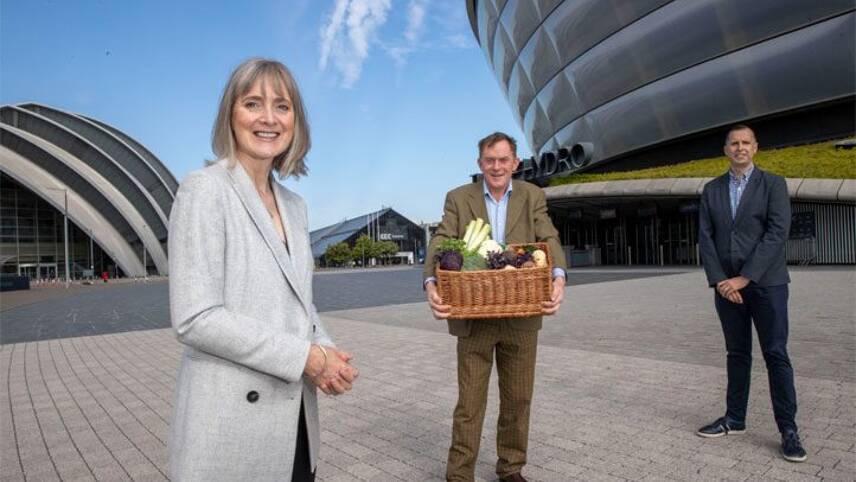Register for free and continue reading
Join our growing army of changemakers and get unlimited access to our premium content

Pictured: Representatives for Levy UK & I and the Scottish Events Campus at the site in Glasgow. Image: Levy
Levy UK & I, the company which has set out the plans, is part of Compass Group and provides food and drinks at conference and sports venues across the UK. Aside from the Scottish Events Campus, which recently updated its own food strategy with a pledge to source 80% of food from Scotland, client venues include the All England Lawn Tennis Club’s Wimbledon, the O2 Arena and Tottenham Hotspur Stadium.
Under the plans, the ban on air-freighted produce will be implemented by the end of 2021. Levy UK & I said in a statement that it had been “developing” the decision throughout the year to date, working with suppliers and other partners to phase out air-freighted products.
The statement detailed how the company has had to amend some recipes and menu choices to better showcase local and seasonal products. Menus will be altered more regularly throughout the year to showcase British-grown fruits and vegetables that are in season, rather than imported alternatives, the statement explains.
“This decision is not about restricting choice, but about working in partnership with our procurement team and our chefs to be even more creative in how we design and deliver food experiences for our customers,” Levy UK & I’s managing director Jon Davies said.
“On the procurement side, it’s about finding alternatives to air freight that are less harmful to the environment. Lots of green vegetables which can be grown right here in the UK are unnecessarily imported from abroad via this method, which carries a huge cost to the health of our planet.
“We will still supply produce such as tropical fruits and avocados where there is demand, but it’s about finding producers closer to home – continental Europe, for example – or less harmful methods of transportation that reduce our carbon impact on the planet, such as boat, road or rail.”
By the end of 2021, Levy UK & I is hoping that less than 20% of its produce will be imported.
To Davies’ point regarding the environmental impact of air-freighted food, the International Transport Forum estimates that freight represents some 7% of annual global emissions, with air freighting being one of the most carbon-intensive ways of transporting food. This poses a challenge to Levy UK & I’s ambitions to become a carbon-neutral company by 2030 and, of course, to the global need to combat climate change while feeding an ever-growing population.
Davies added that phasing out air freight in Levy UK &I’s procurement and supply chain has “long been [the company’s] ambition”.
Broader commitments
Other environmental commitments from the firm include reducing food waste by one-fifth this calendar year and halving beef use within the same timeframe.
To the former commitment, food waste had, until recently, been estimated to account for some 7-8% of annual global emissions. A report from WWF last month outlined how the proportion could actually be 10%.
To the latter, emissions from livestock are estimated to account for 15% of annual global emissions. While lower-carbon beef production methods are commonplace in geographies such as the UK, globally, production has been high-carbon historically. By some estimates, the carbon intensity of beef is four times higher than for chicken and at least ten times higher than most plant-based proteins.
Catch up with all the latest with edie’s COP26 Action Tracker
With less than 100 days to go until COP26, edie has launched a new series that will provide a regular temperature check of global climate action from nations and businesses.
Called the COP26 Action Tracker, this series of articles features updates on UK policy, international policy, business action and the crucial events that are taking place between now and November.
Read the latest edition of the series, published today (4 August), here.
Sarah George


Hey great!!! Be sure to tell all the big retailers to ban air-freight goods too – probably about 6m tons/year of UK’s 200mt/yr non-domestic emissions?